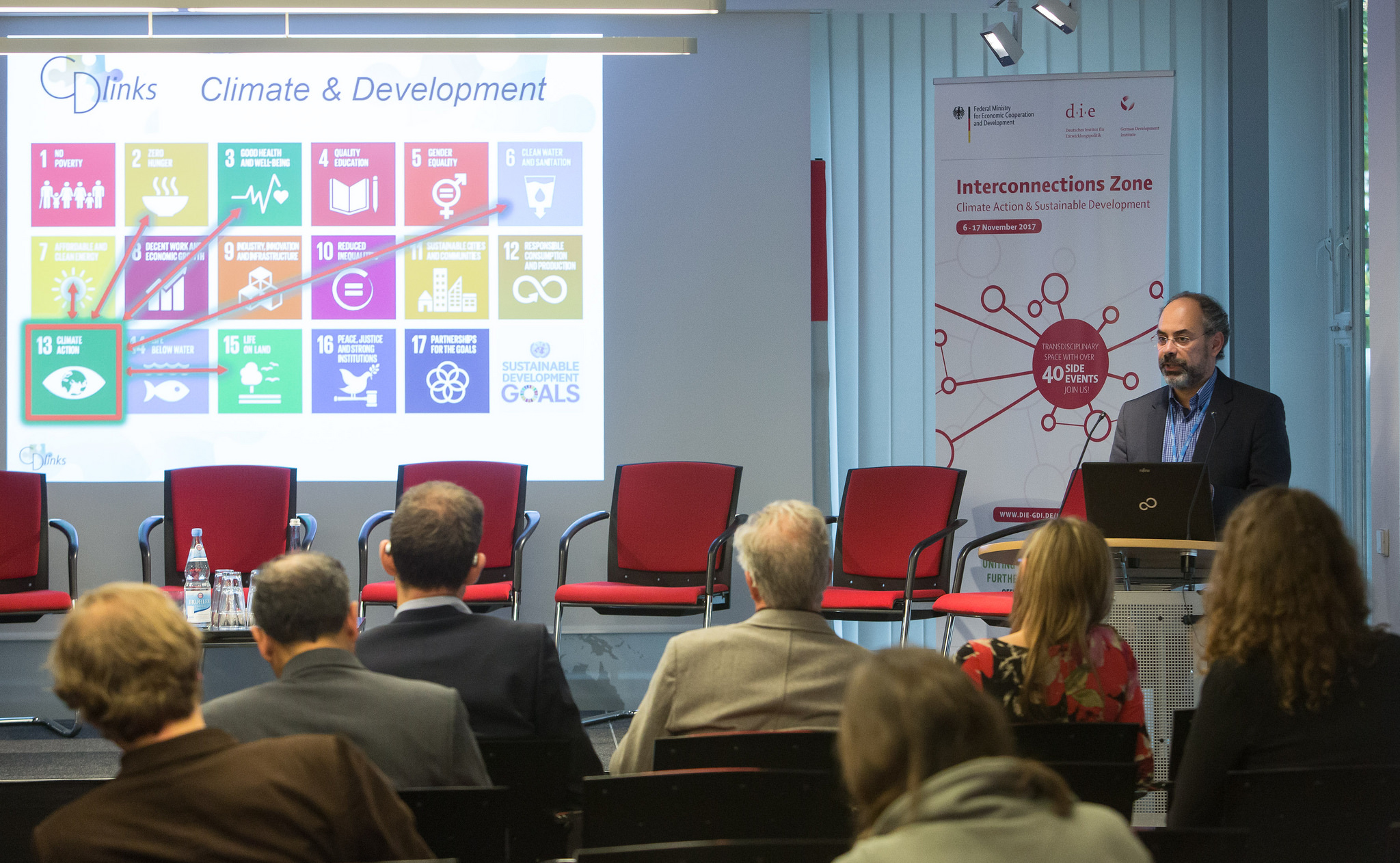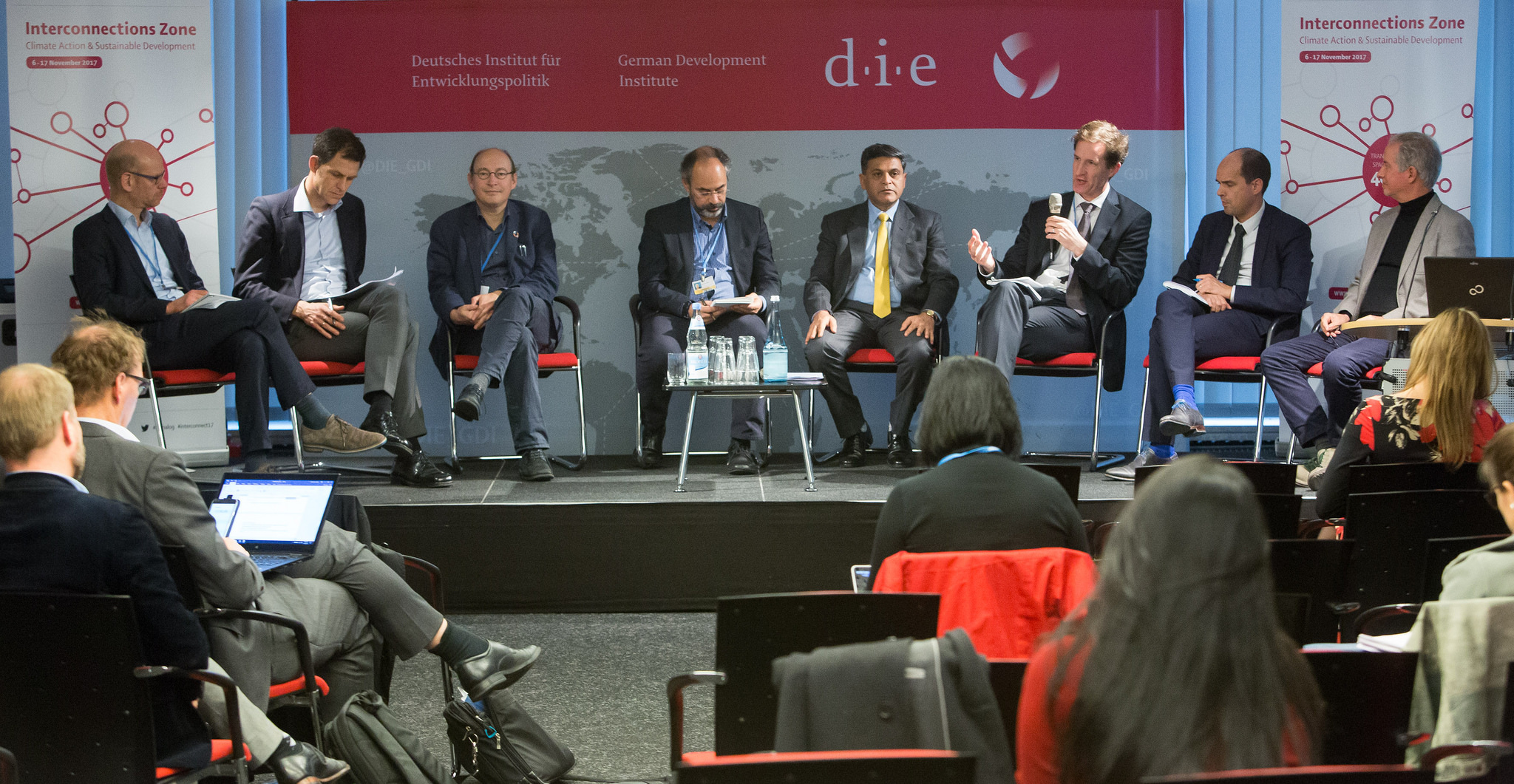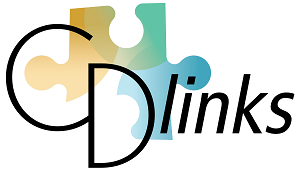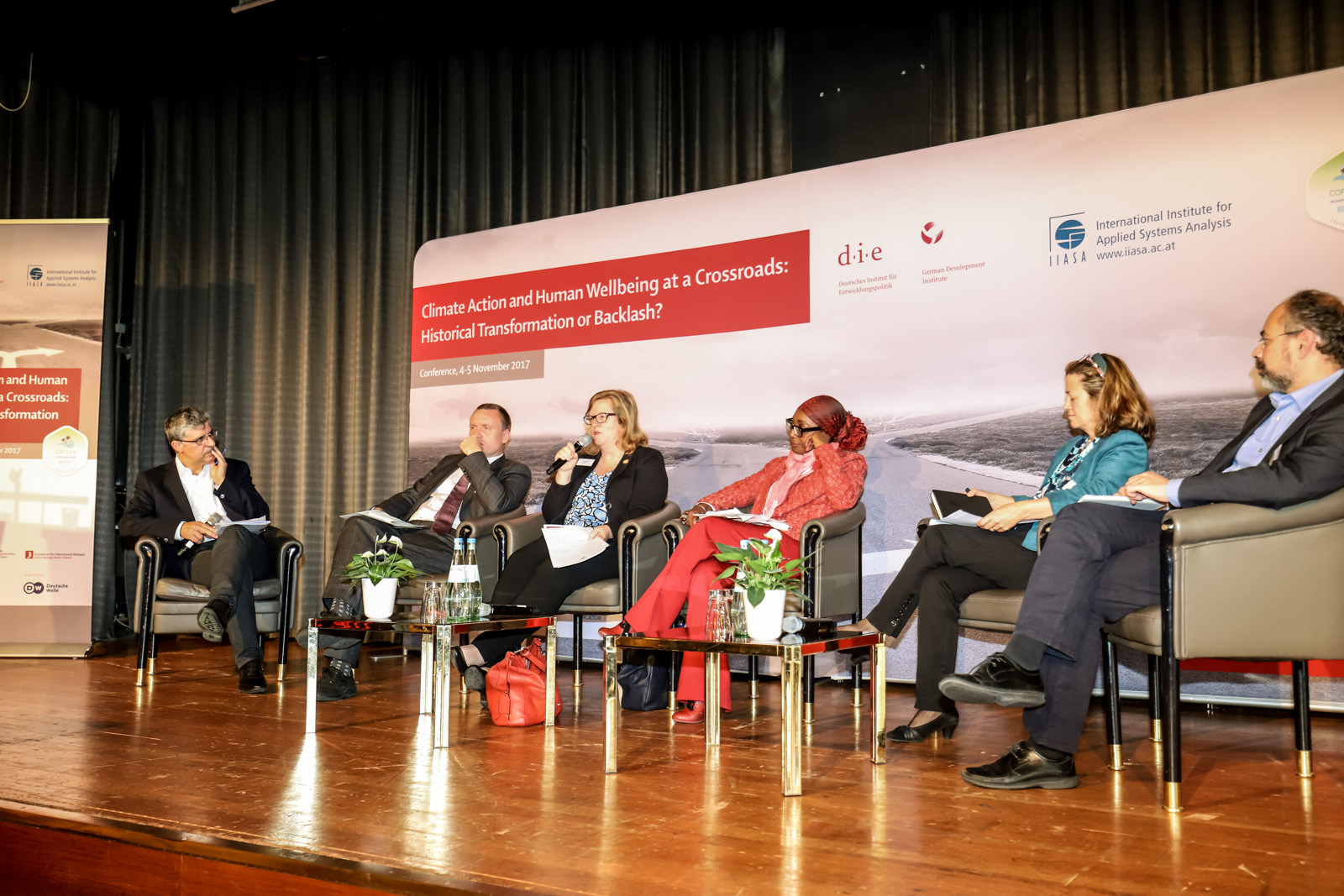CD-LINKS at COP23
The CD-LINKS project had a busy two weeks during the 2017 United Nations Climate Change Conference twenty-third Conference of the Parties (COP23), with a total of six activities. Two official CD-LINKS side events took place in the Bonn Zone, two presentations were given at separate events at the World Wide Fund for Nature pavilion, one side event was held in the Interconnections Zone hosted by the German Development Institute; in addition, prior to the opening of COP23 insights from the CD-LINKS project were presented at a plenary discussion for an event hosted at the German Development Institute titled ‘Climate Action and Human Wellbeing at a Crossroads: Historical Transformation or Backlash?’
Background
Two significant agreements were formulated in 2015: the Paris Agreement within the United Nations Framework Convention on Climate Change and the establishment of the Sustainable Development Goals (SDGs) adopted at the UN Sustainable Development Summit. The transformation by countries to low a carbon future in order to meet the 1.5 or 2°C temperature targets outlined in the Paris Agreement is expected to have significant impact on the SDGs. The SDGs are inherently connected, and of paramount importance for climate policy. Understanding how climate policy will influence the other SDGs is critical to incentivise further action and to understand how climate policy trade-offs can be avoided. For example, actions taken to reduce climate pollutants from transport or agriculture could help reduce global warming and would also have a positive effect on SDG 3 good health and well-being, because of the harmful effects of climate pollutants to public health. However, some climate change mitigation policies may need large-scale land based measures such as bioenergy production or afforestation that could have a negative impact on SDG 2 zero hunger because of the implications for food security.

Interconnections Zone, 13 November © German Development Institute / Deutsches Institut für Entwicklungspolitik
To maximize synergies between the two agreements made in 2015 and to support national policy making within climate and development issues, interactions between climate policies and the SDGs need to be better understood. The research project CD-LINKS brings together a consortium of 19 leading international research organizations to explore national and global climate transformation strategies and their linkages to a range of SDGs. The project is financed by the European Commission’s Horizon 2020 programme.
CD-LINKS at COP23
Each of the three CD-LINKS side events during COP23 presented the most recent outcomes of the CD-LINKS project and examined the links between climate and development. The scientists of the CD-LINKS project made comparisons of the strategies to reach the 1.5 and 2°C goals for key countries like Brazil, China, the European Union, and India, along with a comparison of the current ambition level of the Nationally Determined Contributions, which are the efforts by each country to meet the goals of the Paris Agreement in reducing national emissions and adapting to the impacts of climate change.

Interconnections Zone, 13 November © German Development Institute / Deutsches Institut für Entwicklungspolitik
There were animated and informative dialogues that took place following the presentations, with panel discussions, along with question and answer sessions with the audience. The CD-LINKS side event hosted at the Interconnections Zone benefited from panel members from the UN Sustainable Development Solutions Network and the European Commission who were able to provide the policymakers’ perspective. Of particular concern was what actions need to be taken now in order to ensure deeper emission reductions in the future, and what the social dimensions of decarbonization are.
For Brazil’s transition to low carbon the role of biofuels and carbon capture and storage was shown to be important, along with an increase in electrification of the transport sector. It was also noted that land use change would need to be managed to allow for the increase in crops for biofuels and enabling afforestation. For India there is a need to increase access to electricity, as 304 million people currently are without access, with the Indian government establishing a target of 100% village electrification by 2019. This will need to be achieved in parallel while significant changes are made to India’s power sector that provides this electricity, such as the retiring of old and inefficient coal power plants, replacing them with clean coal technologies and other low carbon technologies such as solar, wind or nuclear. An important role is also attributed to actions to improve energy efficiency in buildings such as changing to light-emitting diode (LED) light sources and energy efficient air conditioners.
The CD-LINKS project also includes global analysis by integrated assessment models that determine whether current policies are on-track to reducing greenhouse gases in line with the Nationally Determined Contributions (NDCs). The analysis shows that the policies fall short of the NDCs and have also calculated how much more reductions are needed to meet the Paris Agreement targets of 1.5 or 2°C. The findings show that further strengthening is needed in all countries, with some countries being close to meeting their NDCs. However, these same countries would then have to make significant increases in effort (i.e. ratcheting up the ambition level of their NDCs) to enable them to meet the Paris Agreement targets. The CD-LINKS project has provided a wide range of outcomes useful in this stocktaking process.
Highlights of the discussions between the 270 guests at the German Development Institute’s Crossroads event included the topics global cooperation and multilateralism, as well as different sectors of the transformation towards sustainability (e.g. mobility, digitisation, financing the transformation and agriculture). The conclusions of the conference are summarised in a Memorandum titled: ‘The Climate – Justice – Cooperation Nexus: 10 Cornerstones of the Great Transformation towards Sustainability’.
Presentations during the three CD-LINKS COP23 side events
Monday 6th November, Climate & Development Links: National decarbonization pathways toward 1.5 & 2°C and impacts on SDGs, Bonn Zone
- Introduction – Keywan Riahi, IIASA
- Informing the global stock-take: National midcentury strategies and global 1.5°C and well below 2°C pathways – Elmar Kriegler, PIK
- Sustainable development implications of global pathways and national mid-century strategies – Volker Krey, IIASA
- Mid-century decarbonisation pathway for the E.U. – Zoi Vrontisi, ICCS
- Mid-century decarbonisation pathway for China – Sha Fu, NCSC
Monday 13th November, Ratcheting up nationally determined contributions (NDCs): Consistent national roadmaps towards the global objective of 1.5 and 2°C, German Development Institute/Deutsches Institut für Entwicklungspolitik (DIE)
- Introduction – Keywan Riahi, IIASA
- Burden-sharing, regional budgets and dialogue process – Detlef Van Vuuren, PBL
- Sustainable development implications of the transformation pathways – Volker Krey, IIASA
- Policy perspective on the NDCs – Niklas Höhne, WU
- National transformation pathways: case of Brazil – Roberto Schaeffer, COPPE
- National transformation pathways: case of India – Amit Garg, IIMA
- Policy perspective – panelist discussion – Tom van Ierland, EC and Guido Schmidt-Traub, UNSDSN
Wednesday 15th November, 1.5 & 2°C strategies, SDGs and green growth – EU Research Projects CD-LINKS and GREEN-WIN, EU Pavilion
- Introduction – Volker Krey, IIASA
- National and global decarbonization pathways – Elmar Kriegler, PIK
- Climate policies and the Sustainable Development Goals (SDGs) – Volker Krey, IIASA
- Reconciling climate and economic goals through green-growth and green-business models – Jochen Hinkel, GCF
- Climate clubs and the macro-economic benefits of international cooperation – Antoine Mandel, Paris School of Economics
The three side events were in partnership with:
- Alberto Luiz Coimbra Institute for Graduate Studies and Research in Engineering (COPPE)
- Centro Euro-Mediterraneo sui Cambiamenti Climatici (CMCC)
- Global Climate Forum (GCF)
- Indian Institute of Management Ahmedabad (IIMA)
- Italian Society for Climate Science (SISC)
- PBL Netherlands Environmental Agency (PBL)
- Potsdam Institute for Climate Impact Research (PIK)
- Wageningen University and Research Centre (WU)

